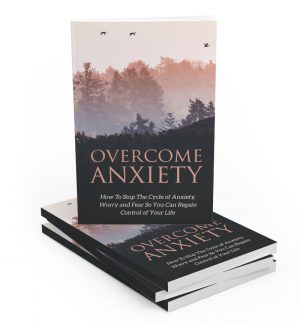 License Type: Master Resell Rights
License Type: Master Resell Rights  File Type: ZIP
File Type: ZIP
 SKU: 62541
SKU: 62541  Shipping: Online Download
Shipping: Online Download
Sample Content Preview
Introduction
Are you constantly afraid, worried, or perhaps nervous? Do you have trouble sleeping, or always feel tired and panicky? Do you often wonder why you can't stop worrying and why you're still fearful? Do you wish you could overcome these issues so you can start living the life you want?
These types of feelings and emotions are often diagnosed as anxiety. These feelings of worry and fear are a normal reaction of the brain that is a result of many factors that are causing an imbalance or challenge to our daily routine. Everyone deals with moments in their life when they feel like the world is about to fall apart on us. During these moments, it can be difficult to describe the feelings of tension, helplessness, and anxiety that is running rampant through our minds. We feel that we would be ecstatic if we could simply disappear and emerge when stressful situations in our lives have passed.
While this is a completely normal reaction to stressful situations, there are times when these emotions and thoughts become so common that they start to have a major impact on our lives. When this happens, you have crossed the line from normal into abnormal. If your feelings of fear become so frequent a debilitating that you have difficulties performing even the most basic of physical activities, then it is a much more serious problem that needs to be addressed. Many people experience this condition, known as an anxiety disorder. Generally speaking, if our reactions to certain situations are much more grandiose than the response of others, then you might be suffering from an anxiety disorder.
Fortunately, if you are suffering from an anxiety disorder, there is hope that you can be successfully treated and start to live a normal life once again. An experience that is free of constant fear, worry, and anxiety. By making some simple changes in your lifestyle and daily routine, you can start to overcome your anxiety and finally be free of the debilitating effects of the condition.
Chapter 1 – Understanding Anxiety
It is a normal reaction for your brain to send alarming signals to your body when it detects danger, leaving your body to react accordingly to that danger. To understand this a bit better, let’s define stress and anxiety. While many believe that stress and anxiety are the same, contrary to that belief, however, stress and anxiety have several differences.
Defining Anxiety
Anxiety is often referred to as the uneasy feeling of worry or concern that is developed when you are deeply tense about something. Feeling a bit anxious when facing major life events is normal. However, if those concerning and worrying feelings persist, even when everything is under control, and you end up becoming affected by the smallest of changes in life, then the chances are likely that you have a serious anxiety condition.
Defining Stress
Stress is the natural feeling that arises from the pressures we experience in our day to day life. Stress signals are sent through the brain when our body and mind are pushed to the limit. When the brain detects a sign of stress, it releases adrenaline into the bloodstream. This release of adrenaline causes the body to feel stress, or weary and tired. The body reacts to this increase in adrenaline, leading to the mind's logical solution of resting. However, if your body refuses to stop, and the adrenaline remains in your bloodstream, it can cause depression, as well as increasing your blood pressure, which can cause other negative reactions in the body. Among these negative reactions is anxiety. Statistics from the National Institute of Mental Health has indicated that more than 40 million American adults, about 18 percent of the adult population have one form of anxiety or another. This makes anxiety disorders the most common of all mental illnesses in the United States.
The Problem with Anxiety
When you can’t control yourself when you are faced with different life situations, this means that you will tend to be more hesitant about making certain decisions, or life changes, because your anxiety can block you from reaching your full potential. When this is coupled with a negative mindset, that is often associated with stress, chances of you succeeding in life are slim. When you suffer from an anxiety disorder, your self-esteem and confidence are typically pretty low since your mind is filled with so many negative thoughts about your value and your abilities.
Besides having an effect on your confidence, the constant tension that you always have because of anxiety can often cause you to suffer from severe headaches and muscle tension that worsens over time. While the negative effects of anxiety might be enough to motivate you to overcome your anxiety, knowing some of the benefits of going through the process can help you want to change.
How Anxiety Might Affect You
For some people who suffer from an anxiety disorder, the physicals symptoms associated with the disease will be much worse than for others. For others, feelings of fear and doom might occur for no reason at all, leaving them feeling scared and unsafe to the point they put up walls around them in order to protect themselves.
The problem with anxiety is that the constant worrying about what might happen to lead them to feel overwhelmed by the world around them. Not only can these feelings have a detrimental effect on their ability to concentrate, but also leaving them unable to sleep or eat. Eventually, this can lead to their confidence levels diminishing and decreasing their ability to keep a positive outlook on their life.
Still, others will choose not to talk about their worries when they are suffering from an anxiety disorder because they don’t believe that others will understand what they are feeling. They not only worry that they will be judged by other people, but they also fear that they will be seen as weak.
Even though many people suffer from different forms of anxiety disorders, many will choose not to let others in on their secret because they feel like they will be misunderstood. There are certain cases where the sufferer from an anxiety disorder will blame themselves for the way they feel even though it is a natural part of life and helps to protect us from real danger.
The good news is that there has been a great deal of research carried out, and is still being carried out, into the different anxiety disorders. As a result, more medical professionals have a better understanding of anxiety orders than they previously had, which allows them to treat the disease and help those who suffer from anxiety disorders cope better. While there are no cures for these kinds of disorders currently, the available treatments can help you feel better and teach you how to handle your anxiety disorder better.
Chapter 2 – Determining Your Type of Anxiety
Before you can begin to deal with your anxiety effectively, you will need to ensure that you have a good grasp of what you are up against. As opposed to mild anxiety that just about everyone experiences from time to time during their life, an anxiety disorder comes in various kinds.
General Anxiety Disorder
People, who experience general anxiety disorder, or GAD, are characterized by experiencing long lasting worry and fear over many things, which can be career, money, family, or even school. Their feelings become unrealistic, which can affect their performance in their daily endeavors. The problem with people having GAD is their inability to point out the specific fear and the problem in controlling their worry.
Generalized anxiety disorder affects about three percent of the US population, and nearly half of those who suffer from GAD are women. Those who suffer from GAD commonly complain about being in a constant state of worry over things like finances, relationships, employment, and health. While this can be said about most folks from time to time, those with GAD feel anxiety regarding a specific situation far more strongly than the situation warrants.
The symptoms of generalized anxiety disorder are the same as common anxiety, expect they are more chronic and severe. They include excessive and ongoing worrying, headaches, irritability, difficulty concentrating, restlessness, a feeling of being on edge, fatigue, sweating, trouble sleeping, nausea, upset stomach, and a sense of constant and impending doom.
- License: Master Resell Rights
- Category:Ebooks
- Tags:2019 Ebooks Master Resale Rights








